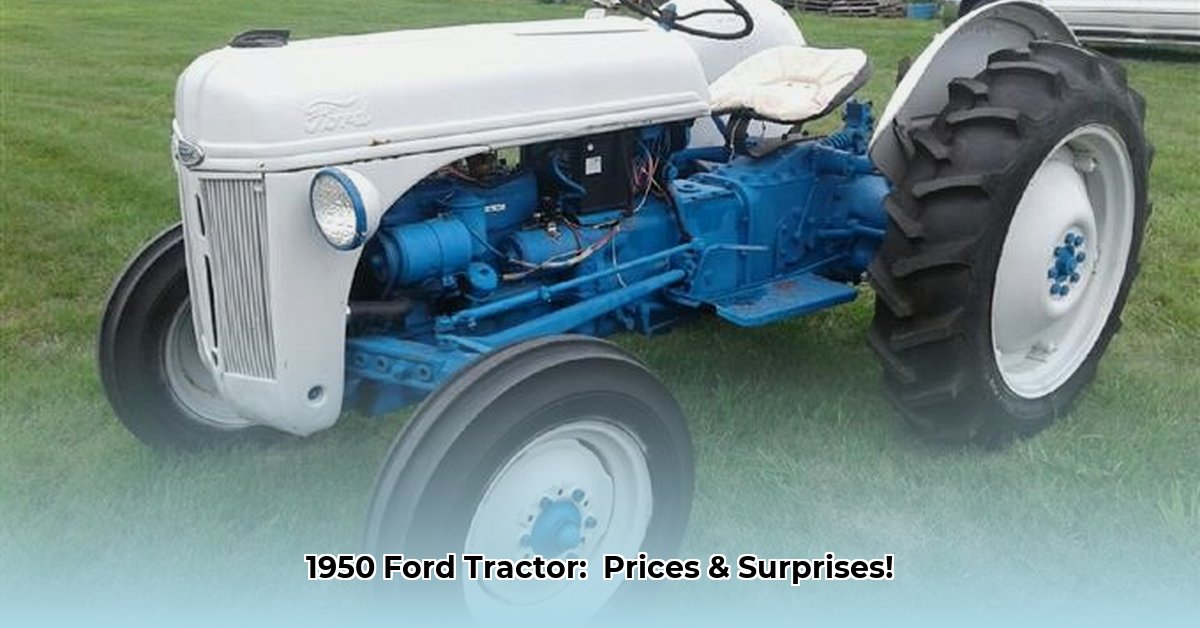
Ford 1950 Tractor: A Collector's Guide to Prices and Trends
Finding a classic 1950 Ford tractor can be an exciting endeavor. These machines represent a significant piece of agricultural history and are increasingly sought after by collectors. This guide provides actionable insights into determining their value, sourcing parts, navigating the collector's market, and understanding the legal aspects of ownership. While precise market data remains limited, we present available information to help inform your journey. For more detailed tractor values, check out this useful resource.
Decoding the Market: Pricing and Trends
The price of a 1950 Ford tractor varies dramatically, primarily driven by condition and originality. Online listings reveal a broad range—from approximately $770 for a project tractor needing extensive restoration, to $33,000 for a fully restored, show-quality example. A small sampling of seven actual sales showed an average of $16,181, but this average is highly misleading due to the immense variation in condition. More comprehensive market data is needed to establish clearer pricing trends. Isn't it fascinating how much condition impacts the value of these classic machines? This emphasizes the importance of thorough inspection and realistic value assessment.
Assessing a 1950 Ford Tractor: A Comprehensive Checklist
Before purchasing, a meticulous inspection is paramount. This involves a systematic evaluation of several key areas:
Engine: Listen for unusual noises, check oil and coolant levels, and assess compression (if possible). Leaks indicate potential problems. A clean engine suggests proper maintenance. How can you tell if an engine has been well-maintained? Look for the absence of excessive grime and oil stains.
Transmission: Shift through all gears; smooth operation is key. Grinding or whining noises signal potential issues requiring attention. What are some common transmission problems in this model? Internal wear and tear, leading to grinding or difficulty in shifting, are frequent concerns.
Hydraulics (if applicable): Test lift and lower functions; leaks or sluggish operation point to problems. What factors might affect the lifespan of the hydraulic system? Regular maintenance, proper fluid levels, and avoiding excessive strain are crucial for longevity.
Body: Examine for rust, dents, and damage. While minor surface rust can often be addressed, extensive rust requires substantial restorative efforts. How can you tell the difference between surface rust and deeper corrosion? Surface rust is usually superficial; deeper corrosion is often accompanied by pitting and structural weakening.
Accessories and Authenticity: Verify the presence and condition of original parts. Aftermarket replacements can diminish value, particularly for collectors prioritizing originality. Expert consultation can prove invaluable in assessing authenticity. Why is authenticity crucial for the collector's market? Original parts and features significantly increase a tractor's value and desirability.
Sourcing Parts and Restoration Resources
Acquiring parts and finding restoration expertise may present challenges. Consider these resources:
- Online Marketplaces: Sites specializing in vintage tractor parts often have a range of offerings.
- Specialty Suppliers: Contact suppliers or dealers specializing in Ford tractors or vintage agricultural equipment.
- Local Mechanics: Seek out mechanics experienced with older equipment. Some may have parts on hand or connections to parts sources.
Navigating the Collector's Market: Best Practices
The collector's market offers several avenues:
| Platform | Advantages | Disadvantages |
|---|---|---|
| Auctions | Wide selection, competitive bidding | Potentially high costs, thorough research needed |
| Private Sales | Potential for better deals, direct negotiation | Increased risk of hidden issues, careful vetting required |
| Online Marketplaces | Convenience, wide reach | Increased risk of scams, potentially tougher deals |
Always research sellers' reputations and conduct thorough inspections before committing to a purchase. What percentage of classic tractor sales involve some form of negotiation? A significant portion of private sales involve negotiation, allowing for price adjustments based on condition and specifics.
Legal Aspects: Registration and Compliance
Ensure compliance with local regulations for registration, titling, and other legal requirements. These vary by jurisdiction and need to be researched before any purchase or sale. Why is legal compliance so critical when dealing with classic tractors? Failure to comply with registration and titling laws can lead to significant legal penalties and difficulties in reselling the tractor.
Future Prospects: The 1950 Ford Tractor's Collector Market Potential
Predicting future trends in the collector market is inherently speculative. However, given the ongoing interest in vintage agricultural machinery and its historical significance, well-maintained and restored 1950 Ford tractors are likely to continue to hold value. Further research into sales data and collector trends is essential for a more accurate assessment. How do overall economic conditions usually affect the prices of collectibles? Typically, stronger economic periods tend to correlate with higher prices for collectibles, while economic downturns can sometimes have the opposite effect.
This guide offers a solid foundation, but thorough research, meticulous inspection, and an understanding of the market are crucial for a successful purchase or sale.